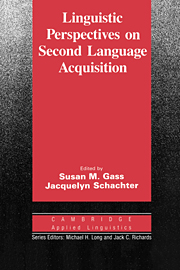Book contents
Chapter 10 - Semantic theory and L2 lexical development
Published online by Cambridge University Press: 05 October 2012
Summary
Among the various lines of inquiry in second language research, there are a number of questions that are of central importance. These questions concern: (1) the extent to which learning a second language is a rulegoverned process: (2) the nature of the developmental stages involved: and (3) the influence of the first language on the second question raised. The literature on lexical development in a second language (L2) has focused almost exclusively on the last of the above-mentioned issues and usually without reference to a formal theory of the lexicon. To my knowledge, a systematic model of how meanings of words are acquired is absent from the field. Most writers on the subject assume L2 lexical development proceeds in the same way as in a first language (L1), without specifying what this is in formal terms. It is the purpose of this chapter to begin to fill this void.
A theory of the acquisition of word meaning relies crucially on the proper characterization of the nature of word meaning. One reason for the state of affairs just described lies in the inapplicability of traditional concepts within the field of lexical semantics to a theory of second langauge word meaning. I will argue that the preference rule system developed by Jackendoff (1983) does provide a characterization of the nature of word meaning, which can serve as a theoretical model for the acquisition of words.
- Type
- Chapter
- Information
- Linguistic Perspectives on Second Language Acquisition , pp. 222 - 238Publisher: Cambridge University PressPrint publication year: 1989

